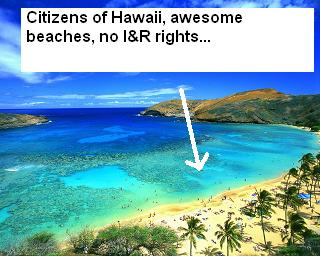Hawaii
More than half of the signatures collected to get a measure opposing genetically modified foods on the Nov. 4 ballot in Maui County were rejected.
Organizers collected more than 9,700 signatures, but the Honolulu Star-Advertiser reported Friday that the Maui County Clerk deemed about 5,000 of them invalid.
The initiative seeks to ban genetically modified organisms in Maui County.
To get on the general election ballot, an initiative petition must have about 8,500 valid signatures, or 20 percent of the number of people who voted in the last mayoral election.
Read More: here
Because Hawaiians have no statewide initiative or referendum rights, the Aloha State earned a “D” on our recently released state-by-state report card on initiative and referendum rights. We like to think that the state’s poor performance will prompt action to give the people more of a voice in government by creating an open and accessible initiative process. Unfortunately, at least one talking head in the state doesn’t want the people to have a greater say in their state government.
The island paradise of Hawaii may have beautiful sandy beaches and clear blue water, but it does not have initiative and referendum rights. Check out a brief history of I&R in Hawaii here.

Ralph Nader’s 2004 Hawaii ballot access case has been in the 9th Circuit Court since last year. The chief issue is whether it is constitutional for Hawaii to require six times as many signatures for an independent presidential candidate as for an entire new party.
You have no statewide Initiative & Referendum rights. There is an initiative process at the county level.
Poll:
See the results of a poll on support for statewide initiative & referendum here.
Hawaii’s territorial Democratic Party convention of 1907 passed a
resolution in favor of I&R, but until the 1950s the territorial government was
dominated by Republicans who opposed the initiative process. After the
Democrats gained power, however, most of them turned against I&R, and
it was not included in the state constitution when Hawaii became a state
in 1959. In the state’s 1978 constitutional convention, initiative advocates
attempted to pass an amendment enacting I&R, but they were narrowly
defeated.
Article XVII: Revision and Amendment
Section 1. Methods of Proposal
Revisions of or amendments to this constitution may be proposed by
constitutional convention or by the legislature. [Ren Const Con 1978 and
election Nov 7, 1978]
A group opposed to Nebraska’s affirmative action law says it won’t appeal a judge’s rejection of their lawsuit challenging the validity of petition signatures
David Kramer, spokesman for Nebraskans United, says the judge’s ruling still leaves questions about whether a petition circulator has to read the entire object statement to each signer.
The last time Hawai’i held a Constitutional Convention, in 1978, the focus was on a political power struggle between the “haves” and the “have-nots.”
In many ways, that same picture is emerging today as the state contemplates holding yet another convention to look at, and possibly revise, our constitution.
The big difference is that the forces that want change and those who are comfortable with the status quo have — in many respects — switched sides.
A state appeals court ruled against an anti-rail group, which has still not yet admitted defeat in its five-month- long attempt to create a ballot question to block the city’s proposed $4 billion rail transit project.
The state’s second-highest court yesterday rejected a motion by Stop Rail Now to order the city clerk to place its question on the November ballot asking voters to prohibit the city from building a rail or train system.
A state appeals court ruled against an anti-rail group, which has still not yet admitted defeat in its five-month- long attempt to create a ballot question to block the city’s proposed $4 billion rail transit project.
The state’s second-highest court yesterday rejected a motion by Stop Rail Now to order the city clerk to place its question on the November ballot asking voters to prohibit the city from building a rail or train system.
A Honolulu judge ruled Thursday that the city clerk’s office must accept an anti-rail petition.
Members of Stop Rail Now say they believe the ruling paves the way to allow Oahu residents to vote on a proposed ordinance this fall that reads, “Honolulu mass transit shall not include trains or rail.”
Circuit Court Judge Karl Sakamoto’s decision means the city clerk must accept and verify within 20 days whether Stop Rail Now has gathered a sufficient number of valid signatures.
Leaders of an anti-rail group say they have collected enough signatures for a petition initiative that could stop the city’s proposed $4 billion rail transit system.
They planned to submit it to the City Clerk’s Office by 2 p.m. today.
Cliff Slater, an organizer of Stop Rail Now, said they had collected about 49,000 signatures as of yesterday, when they made their final rally for signatures outside the organization’s South Street headquarters.
